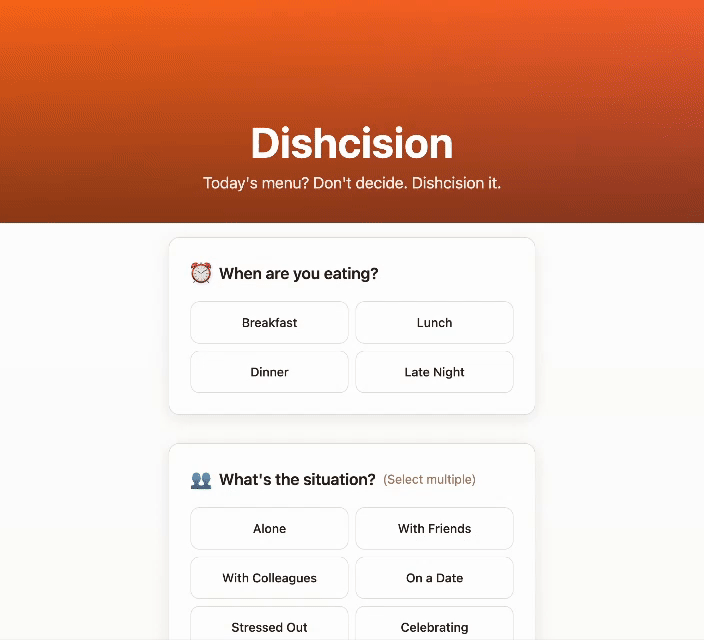[Mini Vibe Coding #1] Dishcision – Today’s menu? Let this tiny tool decide for you
Built to solve the everyday “what to eat” dilemma with fast, simple logic.
![[Mini Vibe Coding #1] Dishcision – Today’s menu? Let this tiny tool decide for you](/content/images/2025/07/Thumbnail.png)
Solving everyday problems with vibe coding #1
🚩 Problem
Too many meal choices causing daily decision fatigue.
💡 Solution
Helps users reduce decision fatigue by quickly suggesting a meal option through a simple web-based tool.
⛏️ Tools used
- PRD: Google AI Studio
- AI Agent: Lovable
- API: OpenAI, Mapbox

Try Dishcision 👉 https://dishcision.lovable.app/
🤔 How I built Dishcision with Vibe Coding
1. Writing the PRD with Google AI Studio
I used Google AI Studio to write a clear PRD. Instead of just saying “make this,” I explained what I wanted to build, what problem it solves, who the users are, and the context behind it.
I asked specific questions to guide the planning:
- What are the strengths and weaknesses of this idea?
- What should I consider before building?
- Will this be useful for the target audience?
- How could this tool grow if developed in stages?
One useful trick: I asked the AI to put the PRD in a code block so it was easier to copy. This is especially helpful for non-developers.
2. Building with Lovable
- Pasted the code into Lovable to build the UI.
- The initial design wasn’t ideal, but improved it through multiple chat-based iterations.
- Lovable integrates with 21st.dev, making it easy to update the visuals by reusing shared components.
- Connected the tool to a basic map API to make it feel functional.
- Future potential: Adding Google Cloud Places API or other location-based features could make it more context-aware and user-specific.
3. Integrated OpenAI API
I also tested a basic chatbot using OpenAI. It added a layer of interaction and showed how even small tools can offer personalized help.
🌱 Takeaways
What worked
- Writing a PRD with AI helped me clarify the problem, not just the idea.
- Seeing quick results kept me motivated to keep building.
- The integration between Lovable and 21st.dev made it easy to apply and adjust code directly.
Challenges I faced
- Simple text prompts weren't enough to accurately control or fine-tune the UI layout.
- Repeated design tweaks through chat sometimes led to losing direction.
What could be improved
- High-quality UI is still hard to achieve. More customization options would help.
- Some AI-generated code didn't run as expected or didn’t apply cleanly in Lovable.

![[Mini Vibe Coding #4] Capsule – Turns any web content into instant insights with AI](/content/images/2025/08/Thumbnail-5.png)
![[Mini Vibe Coding #3] Daily Gratitude – The simplest way to keep your gratitude journal](/content/images/2025/08/Thumbnail-3.png)
![[Mini Vibe Coding #2] FindMyAI – Find the right AI yool for your needs in seconds](/content/images/2025/08/Thumbnail-1.png)
